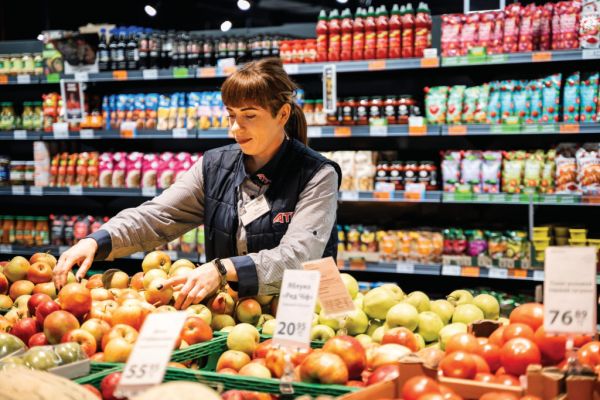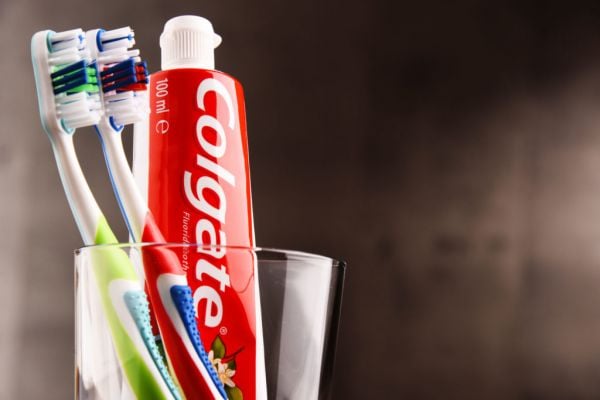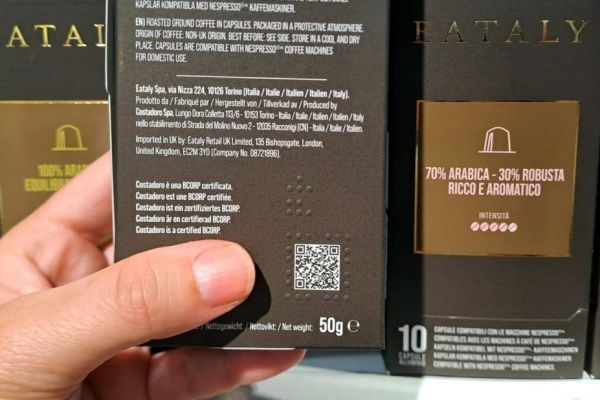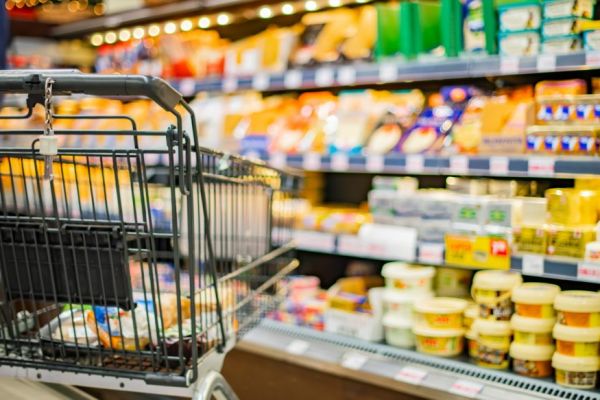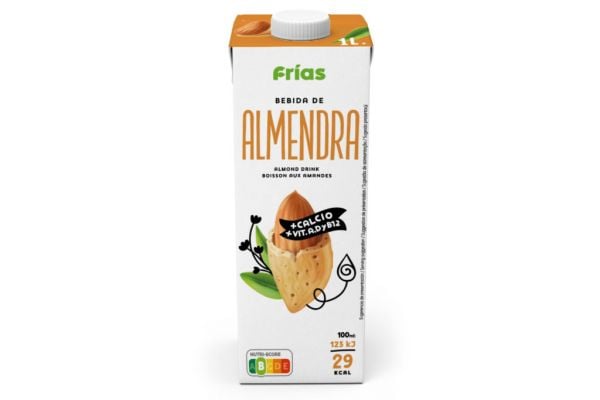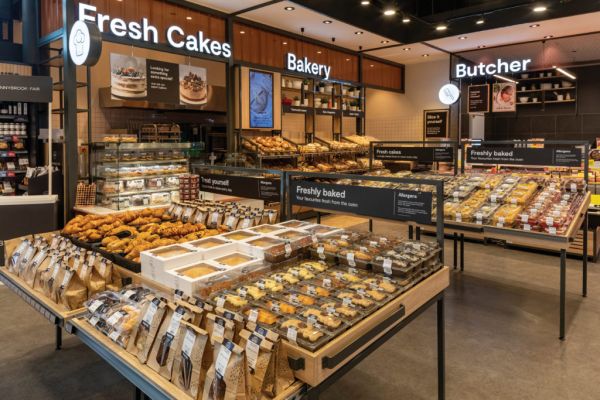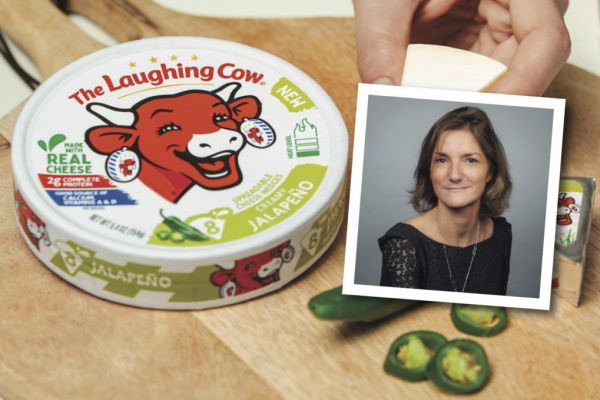Despite more than two years of war, Ukrainian retailers are as active as ever when it comes to private-label development, writes Nina Mishchenko. This article first appeared in ESM's May/June 2024 edition.
Amidst an ongoing war, the Ukrainian private-label market has seen the emergence of key trends such as healthy food, farm products and online sales. These trends, driven by evolving consumer preferences and the imperative to support local producers, are expected to persist in the post-war era, contingent upon the preservation of Ukraine’s infrastructure and the survival of its production facilities.
Over the past two years of full-scale war, the Ukrainian market has witnessed two distinct phases of growth and decline for private labels, explains Sergiy Chornyi, director of private-label development at the Varus supermarket chain, which boasts 108 stores.
The first phase began in February 2022, with the outbreak of active hostilities and the exit of top brands from the Ukrainian market. According to Chornyi, this led to a sharp increase in the share of private labels.
The second phase, which commenced in February 2023, saw the return of top brands to the Ukrainian market. These brands, through aggressive promotional offers, aimed to regain their customer bases. In response, local producers ramped up their investment in promotional campaigns to retain their share of the private-label market, showcasing their resilience and adaptability in the face of adversity.
Despite the tumultuous conditions, the share of private labels in the Ukrainian market has not only recovered, but also continued to grow. Currently, private labels make up 12.5% of Varus’s revenue. The supermarket chain has successfully implemented a good-better-best segmentation strategy, featuring three key brands: Vyhoda (good), Varto (better) and Origin (best).
About 93% of Varus’s private labels are manufactured by Ukrainian producers – a clear testament to the retailer’s commitment to supporting local businesses. The categories with the highest share of private labels in Varus are bulk products and household goods.
“However, there are categories where we still need to be represented. These include alcoholic beverages and tobacco products,” says Chornyi.
A Growing Share
The modern retail market in Ukraine is relatively young, but private-label sales reached 13.8% of the total market in 2023. According to a Nielsen report, the share of private label in terms of the turnover of the entire retail market slightly decreased (by 0.8%) last year, after growing in 2022.
The largest Ukrainian retailer – ATB, with over 1,200 stores – has strategically developed its private-label brands to hold the largest share of private label by revenue. In 2023, the share of goods supplied to the ATB chain under its private-label brand amounted to approximately 29% of the total assortment – more than double the Ukrainian market average.
ATB has three main private-label groups – Svoya Liniya, Rozumnyi Vibir, and De Luxe Foods & Goods Selected – and it does not use the good-better-best segmentation. As the largest discounter in the market, it focuses on pricing: cheap (first price in the category), mid-priced, and more expensive.
“But cheap, in this case, does not mean that it is of lower quality than the middle and expensive segments because many factors influence the price – from the type of packaging and materials from which it is made to the complexity of the product itself, its recipe and its taste,” an ATB spokesperson said.
At ATB, the highest private-label penetration is in categories that are not brand dependent, such as cereals, sugar, pasta, salt, canned goods, eggs, flour, cotton pads and swabs, laundry soap, toilet paper, and others. Conversely, the lowest percentage of private labels are observed in categories where brands are well represented and where the number of suppliers or the level of competition is low, such as dairy products, chilled meat (including poultry), salted fish, spirits, beer, ketchup, sauces, chewing gum, chocolate and juice.
There are also minimal opportunities for producing private-label goods in many non-food groups because the share of products made in Ukraine is tiny.
Private-Label Penetration
Not all Ukrainian retailers like to disclose their private-label percentages in terms of turnover, and instead focus on the number of their SKUs.
For example, the country’s second-largest retailer – Fozzy Group, which operates the brands Silpo, Fora, Trash, and Fozzy Cash&Carry, together amounting to 740 stores – last year introduced 265 new SKUs across different categories, bringing the total number of private-label units in its offering to more than 1,440.
Fozzy Group currently operates approximately 30 private-label brands, including Premiya, Povna Chasha, Feels Good, Zelena Krayina, Marco Cervetti, Lavka Tradytsii, Premiya Select, Vlasna Kondyterska, Sytyi Dvir, and Beermaster Brewery. The ratio of food products to non-food products is 80% to 20%.
“Our share of private labels increased in both 2022 and 2023,” commented Audrius Borisa, head of the private-brand and packaging departments at Fozzy Group. “We have seen an increase in almost all product categories, including canned food, groceries, dairy products, healthy food, household chemicals, etc.”
Borisa adds that the group also noticed a gradual shift in guest (as Fozzy calls its customers) preferences toward high-quality private-label products with unique characteristics – healthy food, environmentally friendly products, and products without hidden ingredients.
Wholesale Offering
While most Ukrainian retailers are currently focusing on local producers, German wholesaler METRO sources 40% of its assortment in Ukraine from foreign suppliers exporting to European countries.
The most popular categories in METRO Ukraine are frozen semi-finished products, canned goods, dairy products, groceries and confectionery, according to Alona Shtanko, head of the private-brand department at METRO Ukraine. Currently, its total number of private-label items is around 25% of the company’s total active assortment.
Since many of METRO Ukraine’s customers are entrepreneurs and HoReCa businesses, the format of its private-label offering differs slightly from that of mass B2C retailers. In addition to the affordable ARO brand and Tarrington House kitchen equipment and furniture, the retailer also boasts brands including METRO Chef, METRO Professional, and Rioba, the latter of which is aimed at cafes and bars.
“The full-scale invasion and its consequences have impacted the optimisation process and the review of the private-label assortment to meet the needs of our key customers,” says Shtanko. “In this regard, the variety of private labels has not changed significantly on a quantitative basis. Still, the structure has changed, and we are also focusing on increasing the productivity of each item.”
French retailer Auchan also operates actively in the Ukrainian market, with 13% of its sales coming from private labels. The retailer, which has 37 stores in the country, manages 12 private-label brands, exclusive to Auchan and produced locally or imported from France and other EU countries. In total, the retailer offers some 20,000 private-label SKUs, of which 3,000 are food products.
Private labels are divided into a number of categories: Pouce and Zelenaya Ptaska (Green Bird) incorporate necessities at affordable prices, Chervona Ptaska (Red Bird) is a mid-price alternative with the best price-quality ratio, and Zolotaya Ptaska (Golden Bird) and Auchan Collection feature premium private labels.
According to Auchan Ukraine, at the beginning of the full-scale invasion, consumers’ primary demands were for core categories such as fresh fruits and vegetables, bread and bakery products, fresh meat and poultry, coffee, and pet food, with many shoppers buying essential goods and low-priced private labels.
Auchan also offers a wide range of non-food private labels, including imported brands such as Actuel (home goods), Cosmia (cosmetics), Airport (travel goods), Qilive (household appliances), One Two Fun (toys for children) and Inextenso (textiles).
Elsewhere, Novus – a Ukrainian supermarket chain owned by the Lithuanian group BT Invest – primarily employs the traditional good-better-best approach to private labels. Novus’s main private-label ranges, which account for 4.1% of its sales, comprise the affordable Marka Promo and the key brand, Novus.
The retailer’s main assortment of private labels is almost entirely (95%) sourced from Ukraine, but Novus is also looking to import products.
“The main challenges we faced were the concerns of some European producers about interacting with Ukraine and the reconfiguration of logistics flows from East Asian countries,” says Natalia Prianikova, head of the private-label department at Novus.
The Challenges Of War
Since the start of the full-scale invasion, a key challenge for most Ukrainian retailers has been establishing a supply chain for goods from abroad and from Ukrainian producers who have come under fire – topics that ESM has written about in the past. The main problem was a shortage of raw materials for private-label production, and disruptions to supply chains led to interruptions thereto. At the same time, any Ukrainian producer could guarantee 100% supply.
“This problem has now been solved – producers have established new supply routes and know what stock of raw materials they need to work with to guarantee the retailer the required amount of products,” says Oleksandr Chornyi at Varus.
According to Chornyi, one of the requirements that must be established during negotiations with new suppliers is that they must guarantee a stable production process, including the availability of alternative power sources.
At the beginning of the war, ATB was forced to stop all projects that had not yet been implemented, pausing its search for new private-label suppliers for a year. Throughout 2022, the retailer worked solely with the suppliers that were in place at the start of that year, and work on developing new positions, tenders, and the search for producers resumed at the beginning of 2023.
“The problems we faced when working on private-label products are associated, first of all, with an increase in the purchase price offered by producers, since they take into account the risks – which are many – as well as […] the increase in logistics costs associated with […] the relocation of production to the western part of the country or beyond its borders,” an ATB spokesperson said.
Border Blockade
Supply chain disruptions are currently arising from Polish farmers’ blockades of the Ukrainian border. These blockades are preventing not only Ukrainian exports, but, in some cases, trucks carrying imported goods into Ukraine.
According to the Retail Association of Ukraine (RAU), operators must seek alternative supply routes for products to Ukraine, increasing the cost of each trip by €600 to €1,000. This will inevitably lead to price increases for some goods for end consumers.
The association also points out that domestic producers need more essential components, equipment and/or packaging from abroad. Given the importance of these imported elements, this could lead to a shortage of specific categories of goods on the Ukrainian market.
“The challenges we face due to the war are relevant to all producers and brands,” says Fozzy Group’s Borisa. “These include hostilities, constant threats to production, and logistical difficulties for Ukrainian manufacturers. For foreign manufacturers, it’s primarily about logistics challenges.”
A second challenge lay with the difficulty of providing power to manufacturing, especially during the winter of 2022-23. Most manufacturers were not prepared for long-term power outages, which led, in some cases, to a significant reduction in, or closure of, private-label production processes.
“Manufacturers faced a shortage of production capacities, which hurt private labels on the market as a whole,” says Varus’s Chornyi. “After all, manufacturers, as a rule, prioritised the production of their brands over private labels.”
However, he adds that this process did not last long, and the flow of generators to the Ukrainian market very quickly restored production capacities for almost all manufacturers. This should help to mitigate future power supply difficulties.
Specialty Ranges And Trends
Despite the war, key trends are gaining traction among Ukrainian consumers: a renewed focus on healthy eating, environmental consciousness, and online sales.
Auchan Ukraine, in particular, has witnessed a resurgence of interest in healthy and sustainable products, with shoppers scrutinising product labels and prioritising quality and ethical sourcing. This shift has prompted Auchan to introduce healthier options, such as gluten-free and lactose-free items.
Auchan Ukraine’s private-label products adhere to strict guidelines, excluding ingredients from a ‘blacklist’ of prohibited substances. The retailer prioritises improved product formulas, avoiding artificial flavour enhancers such as MSG and synthetic dyes like carmine and carmoisine.
In line with this trend, Fozzy Group became one of the first Ukrainian companies to adopt the Nutri-Score labelling system for its private-label products in 2023. According to Fozzy Group’s Borisa, this highlights the retailer’s commitment to introduce new products in healthy, vegan and innovative categories, “[boasting] unique components and sophisticated packaging.”
Elsewhere, Varus’s aptly titled Domashny Koshyk (Home Basket) range features items from small farms, family-run businesses and rural communities, while Auchan Ukraine strongly emphasises supporting and developing Ukrainian producers and farmers through its Filière project.
Filière is a network of responsible producers and farmers who adhere to sustainable practices, prioritising environmental stewardship, employee well-being, and ethical labour conditions.
Supporting SMEs
As competition intensifies in the Ukrainian marketplace, many small and medium-sized enterprises may need help to compete with large brands for shelf space. ATB is seeking to address this by providing a series of supports to SMEs, ensuring stable production capacity utilisation and taking on the responsibility of promoting their products.
ATB believes that future opportunities for private-label development lie in expanding product ranges, leveraging new technologies to enhance quality and production monitoring, and integrating sustainable practices into the manufacturing process.
In general, collaboration between Ukrainian retailers and local producers is gaining momentum. This is driven by a shared desire to support the Ukrainian economy, promote sustainable practices, and provide consumers with access to high-quality, authentic Ukrainian products.
As the country continues to navigate the challenges of war, these partnerships play a vital role in fostering resilience and building a stronger, more sustainable future for Ukrainian agriculture and retail alike.
This article first appeared in ESM's May/June 2024 edition.
